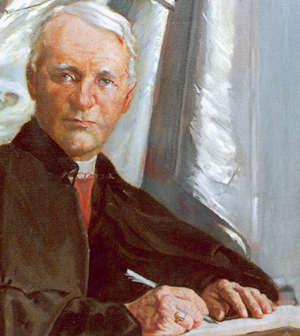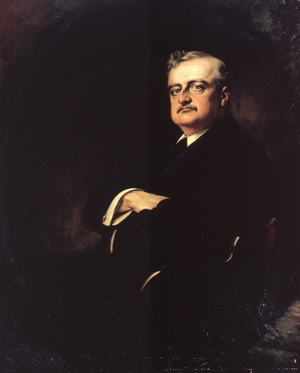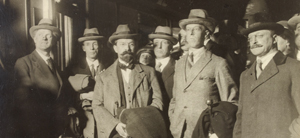The definition of British rule in Ireland as ‘usurpation’ (with some reference to Brexit)
Published in Issue 4 (July/August 2019), Platform, Volume 27The interesting article by Brian Hanley on ‘the shadow of Strongbow’ in the last issue (HI 27.3, May/June 2019) made reference to the word ‘usurpation’ as a description of the character of English rule in Ireland. Reflection on the significance of this word provides not only an unexpected connection between Patrick Pearse and John Redmond but also a particular insight into the legitimacy of Brexit.
By Brian P. Murphy OSB

Above: Bishop O’Dwyer of Limerick—in a private letter to Bishop Foley of Kildare and Leighlin on 14 December 1916 he said that ‘the English Parliament in Ireland is a usurpation’. (Limerick Municipal Art Gallery)
‘Usurpation’ was the word used by Bishop O’Dwyer of Limerick on 16 September 1916 to justify the actions of those who had planned and participated in the Easter Rising. In a speech made after receiving the Freedom of the City of Limerick, he declared that ‘these Irish Volunteers imagined that Ireland had an inalienable right to govern herself: that the deprivation of it was worse for every interest of their country … that it was a usurpation and that resistance to it was a duty’. He made the point more succinctly in a private letter to Bishop Foley of Kildare and Leighlin on 14 December 1916: ‘the English Parliament in Ireland is a usurpation and, having regard to the modern development of the idea of nationality and its rights, I would hold that, positis ponendis [taking everything into account], it would justify revolt’.
In short, the three traditional reasons given for a just rebellion—a tyrannical ruler, no chance of constitutional reform and a rebellion that offered a reasonable chance of success—did not apply in Ireland’s case. Surprisingly, Bishop O’Dwyer did not advert to the fact that the very word ‘usurpation’, so central to his argument, had been used in the Proclamation of the Republic by Pearse on 23 April 1916:
‘We declare the right of the people of Ireland to the ownership of Ireland, and to the unfettered control of Irish destinies, to be sovereign and indefeasible. The long usurpation of that right by a foreign people and government cannot extinguish that right.’
The same word was used to significant effect in the proclamations of the First Dáil Éireann on 21 January 1919. The Declaration of Independence stated that the Irish people is by right a free people and ‘for seven hundred years the Irish people has never ceased to repudiate and has repeatedly protested in arms against foreign usurpation’. It continued, with a forcible reminder that Lord French had acted as a military governor since 6 May 1918, that ‘we solemnly declare foreign government in Ireland to be an invasion of our national right which we will never tolerate, and we demand the evacuation of our country by the English Garrison’.
In this context it was supremely ironic that the next declaration of the Dáil, the ‘Message to the Free Nations of the World’, was read in English by Robert Barton, who had served as a British military officer in Dublin during the Easter Rising. He had left the army at the end of the Great War, returning to his landed estate in County Wicklow, and had not only joined Sinn Féin but also been elected for the party in the 1918 general election. Barton’s speech contained the word ‘usurpation’. He declared that Ireland ‘has never relinquished her national rights, and throughout the long era of English usurpation she has in every generation defiantly proclaimed her inalienable right of nationhood down to her last glorious resort to arms in 1916’.

Above: John Redmond—in a speech on 9 August 1902 he said that ‘fraud, robbery and murder have characterised the English usurpation of the government of our country’. (NGI)
There was clear continuity between the declarations of Dáil Éireann in 1919 and the 1916 Proclamation but, significantly, the continuity did not end there: John Redmond had used the same word—usurpation—with similar intent as far back as 1902. Redmond made his statement on 9 August of that year, in a speech in Dublin’s City Hall which was timed to coincide with the coronation of King Edward VII. Speaking as leader of the Irish Parliamentary Party, Redmond affirmed that ‘this Party, as a body, has formally withdrawn from all participation in the Coronation celebrations, and we are assembled here to-day to place once more upon record the protest of our people against the usurpation of the government of Ireland against the English Parliament’. These words were uttered at the start of his speech.
Having described the Act of Union as ‘a crime of the deepest turpitude’, using the words of W.H. Lecky, Redmond maintained that ‘from that day Ireland has never ceased to protest against the usurpation of the government of Ireland by the English Parliament’. Then, in words reminiscent of Pearse, he declared that Ireland ‘has protested by means of armed insurrection, and generation after generation has witnessed brave and gallant men sacrificing their lives … in defence of Irish freedom’. He added that ‘fraud, robbery and murder have characterised the English usurpation of the government of our country’.

Above: Robert Barton (second from right) during the Treaty negotiations in London in 1921. When delivering the First Dáil’s ‘Message to the Free Nations of the World’ in January 1919 he declared that Ireland ‘has never relinquished her national rights, and throughout the long era of English usurpation she has in every generation defiantly proclaimed her inalienable right of nationhood down to her last glorious resort to arms in 1916’.
Redmond concluded that ‘we submit to the English usurpation of the government of Ireland, but we do so because we have no adequate means of successful resistance; but we do loathe English rule, and we will take no part in the jubilation of the Coronation’. The word ‘usurpation’ appeared four times in his speech, which was endorsed by John Dillon and William O’Brien, and a resolution embodying his views was passed unanimously.
After Redmond’s death on 6 March 1918, his ideals were given formal expression by all Irish political parties on 18 April 1918, when they responded to the plans of the British government to apply conscription to Ireland. A statement issued by the leaders of Sinn Féin, the Irish Parliamentary Party and the Labour Party declared that British policy ‘must be regarded as a declaration of war on the Irish people … it is in direct violation of the rights of small nationalities to self-determination’. Although the word ‘usurpation’ was not used in this statement, the declaration looked back to the words of Redmond in 1902, to the Proclamation of Easter 1916 and forward to the declarations of Dáil Éireann in January 1919.
The message was clear and convincing: an imperial power, using military force, has no legal right to claim legitimate title over an independent nation state; nor, with even greater reason, does it have a legal right to draw boundaries on the territory of that state. There appears to be a lesson here for us as we face the challenges of Brexit. Granted that Redmond and Pearse viewed British rule in Ireland as usurpation, and that both agreed with Parnell that ‘no man has a right to fix the boundary to the march of a nation’, it would seem reasonable to suggest that any Brexit proposal should be postponed until the legality of the boundary that divides the country of Ireland be adjudicated upon by the United Nations. Spain may wish to bring the case of Gibraltar to the same forum.
Brian P. Murphy OSB is a member of the Benedictine community at Glenstal Abbey. His latest book is The life and tragic death of Winnie Barrington (Papaver, 2018).
















